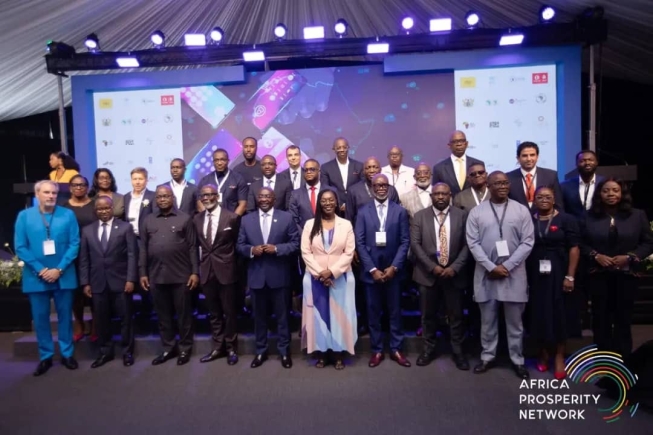Vice-President Dr Mahamudu Bawumia’s proposal last Friday that mobile money (MoMo) should be promoted as a single currency to promote intra-African trade, calls into question ongoing efforts by the African Continental Free Trade Area (AfCFTA) to build an African payments system.
It also calls into question the commitment of African leaders to create an African currency – one of the dreams of the Organisation of African Union, now the African Union (AU).
Dr Bawumia was speaking last Friday at the Africa Prosperity Network (APN) Interoperability Symposium in Accra, as reported in Graphic Online. Dr Bawumia highlighted the persistent low levels of intra-African trade, averaging 13 per cent for intra-African imports and 20 per cent for intra-African exports over the past seven years.
He cited the inability of countries to achieve the kind of convergence criteria required for a single currency to succeed. According to the Vice President: “We’ve not had a situation where all our countries have been able to consistently achieve the key convergence criteria, whether you’re talking about inflation or the deficit or the reserves or exchange rate depreciation, it has been difficult.”
Dr Bawumia continued: “If we are serious about it, we can work towards mobile money operability at the continental stage. We should therefore move away from the macroeconomic convergence criteria to digital payments convergence criteria.”
But according to AfCFTA National Coordinator, Dr Fareed Arthur: “AfCFTA has a digital payment system already, the Pan-African Payment and Settlement System (PAPSS), which is designed to solve the same problem.”
Indeed, the Vice-President acknowledged the existence of PAPSS, developed by the AU and the African Export-Import (Afrexim) Bank.
Read also: Bawumia advocates mobile money as African common currency
PAPSS
PAPSS is a financial market platform launched in January 2022. It enables payments to cross Africa without having to pass through correspondent banks outside Africa. Intended to increase trading under AfCFTA, it will be rolled out in the Caribbean region by the end of this year.
But one Accra-based entrepreneur, who disagrees with the Vice President’s proposal is Meron Dagnew, founder and managing partner of BE Kollective, a company that imports Arabica coffee from Ethiopia and exports Ghanaian cocoa and Robusta coffee products to various markets.
“MoMo and PAPPSS are just financial platforms. PAPPSS facilitates payments in local currency. But traders don’t want to get paid with their currency because we need to buy inputs from different places and the world is trading in dollars,” says Dagnew, who was featured in Your Ghana, My Ghana last week.
Dagnew concedes that MoMo is less costly than sending money in dollars since wire transfers through the bank cost between US$ 75 and US$ 100 a transfer. “But why would anyone use MoMo in their currency for anything other than small transactions here and there?” Dagnew says.
She continued: “It can help in terms of speed and reducing the cost of transacting a bit. But most of us traders don’t use MoMo because we want to get paid in dollars. And that’s why we use traditional banks.”
Dagnew is clear about the solution needed by African entrepreneurs. “The solution is to have our currency, not just a platform, especially when we’re transacting in someone else’s currency.
Since most traders want to be paid in dollars, there’s a need to use traditional payments,” Dagnew points out. “They’re trying not to solve the problem but to get a payment or transaction platform. MoMo is not a currency,” Dagnew said emphatically.
When Your Ghana, My Ghana communicated these objections to the NPP’s Communication Director, Richard Ahiagba, he denied that the move would take attention away from creating a single currency.
Ahiagba believes the convenience of MoMo, as outlined by Bawumia, would help to promote trade, increase productivity and help drive employment and GDP growth. “What it does is provide a platform for transactions in the immediate term. AfCFTA itself didn’t wait for a common currency to start.
So this will provide incentives and reveal loopholes that need to be tightened. And one of them could be working ultimately towards a common currency. So it will be a catalyst for dealing with some of these problems and over time this conversation will grow,” Ahiagba told Your Ghana, My Ghana.
The idea of having a single African currency to facilitate regional integration has been a post-colonial dream of forward-looking African leaders.
Strategy
The AU’s strategy for economic and monetary integration is to strengthen existing regional economic communities and oversee the emergence of an African Economic Community, an African Central Bank and a single currency.
The benefits of a single currency to individual consumers and businesses include stable exchange rates and prices, lower costs and a greater flow of trade between member states. It also makes it easier to compare prices across borders and secure the best prices, making it cheaper and less risky to do business and invest.
The disadvantages are often seen as loss of national sovereignty and macroeconomic challenges such as setting an appropriate level of inflation across diverse countries.
In Africa, champions of monetary union and economic integration worry that not all countries will be willing to join a single currency area or adapt their policies to a standard of best practice.
But given Ghana’s history as a champion of African independence and its reputation as a beacon of political stability on the continent currently, not to mention its hosting of the AfCFTA Secretariat in Accra, it is not farfetched to believe that the country can mobilise the level of political will necessary to advance the cause of monetary union and economic and political stability in the West African sub-region and continentally.

